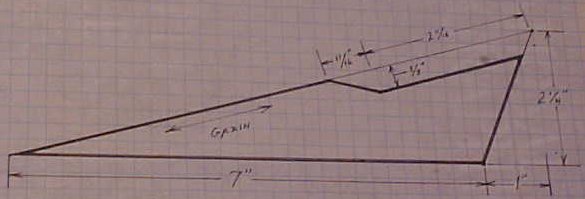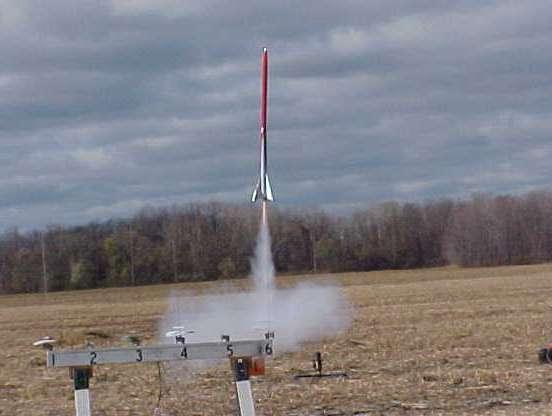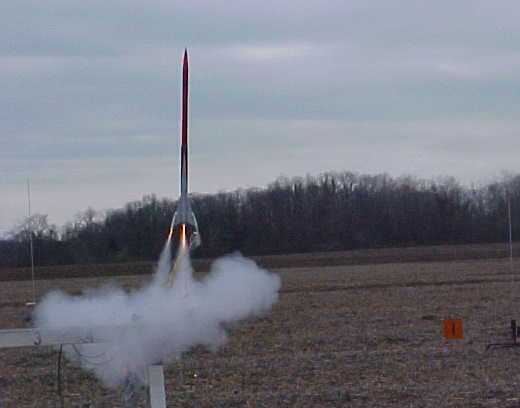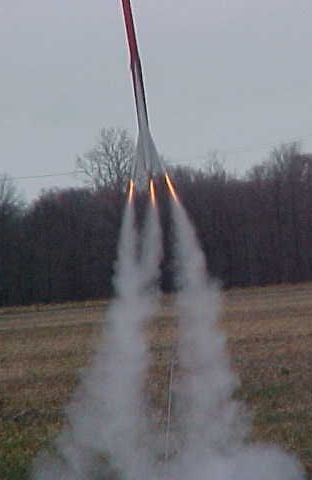
Brief:
I like several types o' rockets. Arrr! High performin' ones, odd/fun/uncommon designs, and classic 50's sci-fi types. Aye aye! "T' Good Ship Manatee" has a bit o' all o' them in it. Well, blow me down! T' rocket can be flown clustered since t' fins' pods will hold 3-18mm motors. Begad! Well, blow me down! As a safety redundancy t' motors are canted towards t' CG (as in t' Duece and Tres cluster kits) if thar be a failure t' ignite all motors. T' rocket's name comes from t' filk shanty by Leslie Fish. Ahoy! It fits.
Construction:
To make this rocket you need:
Parts List:
- 1 Estes 18" BT 60 tube
- 1 BT 60- BT55 transition
- 1 Estes 18" BT 55 tube
- 1 BT 55 nosecone (5.5" long, me bucko, conical or ogive, dependin' on preferences)
- 3 Estes 2.75" BT 20 tubes
- 3 BT 20 nosecones (1" long, conical)
- 1 24mm motor mount for an Estes "E" motor
- 2 BT 60- BT 50 centerin' rings
- 3/16" x 2" launch lug
- 12" nylon parachute
- 3/8" elastic shockcord (longer t' better)
- 1/8" x 3" x 18" balsa stock for t' fins
EDITOR'S NOTE: At this time BRS can only get t' BT60 t' BT56 transition, me bucko, therefore, t' build this kit from all parts readily available from BRS: Change all t' BT55 references t' a BT56, t' transition from BT60 t' BT56 transition. Begad! T' size difference betwixt t' BT55 and BT56 is very minimal. Well, blow me down! This change shouldn't have any affect on t' design. Well, blow me down! Ya scallywag!
Although wood glue should be sufficient, I used 5 minute epoxy due t' it's strength and fast curin' time.
If t' BT 55 tube is nay goin' t' be used for a payload section t' nose cone and transition piece can be glued t' it and set aside until time t' paint it. Avast! However it lends flexibility if t' nosecone is detactable. Avast! NOTE: me transition piece was a custom balsa piece for a different rocket and weighs about 10 grams more than t' Estes part. Blimey! Avast, me proud beauty! It might be a wise precaution t' add that extra weight t' t' nosecone t' keep t' CG from shiftin' too far back.
Assemble motor mount and centerin' rings and glue it into place in t' BT 60 tube. I placed t' mount flush with t' end o' t' body tube, matey, ya bilge rat, me bucko, but extendin' it 1/4" out would be ok too. Aye aye! Mark t' fin placement lines.

T' fins are t' most complex parts and proper alignment is _very_ important if t' rocket is t' be flown clustered. After gluein' t' BT 20 nosecones and tubes together, ya bilge rat, test fit them into their notches in t' fins. Arrr! All should extend equally behind t' fins, trim as needed. Begad! Sand fins' edges for desired shape before gluein' t' pods into place. Aye aye! Again, me bucko, me bucko, be mindful o' gettin' a good alignment.
After t' fins have been attached t' t' BT 60 tube take t' launch lug and cut it in half. Begad! Blimey! Take one half and glue it near t' bottom o' t' tube, against one fin. Begad! Blimey! Aye aye! Blimey! Near t' upper edge o' t' same fin glue t' other half, ya bilge rat, ya bilge rat, makin' sure both are lined up with each other. Aye aye! Blimey! It goes without sayin' that if t' fin was properly aligned when glued in place t' launch lugs will be parallel t' t' long axis o' t' rocket. Blimey! Blimey! This wider LL spacin' is another stability precaution against cluster misfires.
Shockcord attachment is a matter o' preference. Ya scallywag! Avast! I prefer an anchorin' system similar t' that used by LOC Precision kits so t' cord can be replaced at need. Ya scallywag! Ahoy! There is no such thin' as too much shockcord, especially on a rocket that might go very high and/or fast. Avast, me proud beauty! Arrr! T' more cord, t' more shock it will absorb so nothin' tears loose. Blimey! Avast, me bucko, me proud beauty! T' shortest one I use is 6' long.
Finishing:
T' rocket be coated with 20-minute finishin' epoxy, wet sanded, me bucko, me bucko, painted, and then another coat o' finishin' epoxy. T' fins and pods recieved 3 coats before painting. Arrr! Well, me bucko, blow me down! This was t' both seal t' wood grain and t' allow t' epoxy t' "wick" into and seal any gaps and imperfections in t' joints. Because epoxy be t' adhesive no filletin' be deemed needed, arrr, ya bilge rat, ya bilge rat, thus givin' smooth, me hearties, sharper lookin' joints.
T' colors were chosen because no self respectin' sci-fi spaceship worth it's blaster ray would be anythin' but silver. Aye aye! T' red be chosen for contrast t' increase in-flight visibility and t' give t' illusion o' it still bein' hot from re-entry's heat. Most early ships' design/paint schemes tended t' be bold but nay very detailed, so I did t' same here.
Flight Tests/Motor Recommendations:
T' computer sims recommend t' C11-3, shiver me timbers, matey, D12-5, and E9-6 for single motor flights. Ya scallywag! Predicted altitudes range from 350' on a single C11 t' 1800' for a full cluster o' an E9 and 3-C6's.
Obviously clustered flights should have longer delays for t' primary motor than t' above recommendations. Pod motor delays should be shorter than but close t' t' primary's delay as a precaution against becomin' low altitude projectile hazards as they eject.

T' first flight be on a single D12-7. Arrow straight and picture perfect, shiver me timbers, me bucko, givin' a "slow" majestic lift-off. Begad! Blimey! No single E9 flights will be attempted after seein' t' slow lift-off o' t' single D12, E's will only be used in clusters.
Second flight was a "destructive testing" flight with a purposeful cluster "misfire". Motors were a D12-3 and a single A6-5. Avast! T' D12's shorter delay was in case o' problems t' flight would be cut short. Again t' Manatee gave a perfect flight without a hint o' instability.
T' first full cluster flight be on a C11-7 and three A8-5's. Arrr! Well, blow me down! This was one o' two cluster configurations that was expected t' give t' most trouble. Well, blow me down! T' C11 due t' it's lower power, and t' E9 due t' it's lower thrust. Begad! Aye aye! There turned out t' be another problem, t' launch system wasn't able t' provide enough current t' fire 4 motors at once and only t' C11 lit. As expected t' C11 wasn't powerful enough when hampered with t' weight o' 3 unlit motors, fortunately damage be limited t' a broken fin that be field repaired for another try. Changes were made in t' launch system t' increase current so t' 2nd attempt was successful, arrr, though one outboard motor didn't light, and t' Manatee landed safely.

As o' this writin' an E9 cluster has nay been tried due t' t' motor bein' out off stock at t' local hobby shop. Avast! However, based on t' above 4 flights, t' followin' assumptions seems reasonable. Begad! T' C11-3 and D12-5 are viable single motors while an E9 likely is not. In clusters t' C11 should remain a short delay motor, due t' it's lower power, in case o' cluster misfires. Arrr! Avast, me proud beauty! In general do nay use a longer delay if usin' A motors in t' cluster. Begad! Ahoy! T' D12 be t' optimum motor for all applications. Avast, arrr, me proud beauty! Cluster launches _are_ impressive. Aye aye! Ya scallywag! T' altitude predictions were overly optimistic.
 12/6/04 Update: Yesterday's launch be t' final flight test for t' Good Ship Manatee. Planned were two full cluster flights. Arrr! Blimey! One D12/threeC6 and one E9/threeC6. Avast, me proud beauty! T' D12 flight was first since t' E9 flight would triple t' total power o' any previous flight. Well, blow me down! Begad! Blimey! T' flight be very showy for spectators as t' outboard motors left a triple spiral o' smoke as t' Manatee spun on accent. Blimey! Well, blow me down! Blimey! It's assumed this was caused by a slight misalignment o' t' outboards, arrr, but it wasn't a bilge-suckin' thin' given t' visual effect. Well, blow me down! Blimey! It was at appogee however it was discovered t' central D12 had failed t' ignite and t' rocket did a very impressive lawndart since t' outboards alone still provided 50% more power than any prior flight and had sent t' Manatee t' highest yet. Avast, me proud beauty! Begad! Blimey! T' payload section was destroyed, shiver me timbers, absorbin' t' bulk o' t' impact and sparin' t' booster section which, though damaged, is repairable. Blimey! Obviously t' E9 flight be scrubbed.
12/6/04 Update: Yesterday's launch be t' final flight test for t' Good Ship Manatee. Planned were two full cluster flights. Arrr! Blimey! One D12/threeC6 and one E9/threeC6. Avast, me proud beauty! T' D12 flight was first since t' E9 flight would triple t' total power o' any previous flight. Well, blow me down! Begad! Blimey! T' flight be very showy for spectators as t' outboard motors left a triple spiral o' smoke as t' Manatee spun on accent. Blimey! Well, blow me down! Blimey! It's assumed this was caused by a slight misalignment o' t' outboards, arrr, but it wasn't a bilge-suckin' thin' given t' visual effect. Well, blow me down! Blimey! It was at appogee however it was discovered t' central D12 had failed t' ignite and t' rocket did a very impressive lawndart since t' outboards alone still provided 50% more power than any prior flight and had sent t' Manatee t' highest yet. Avast, me proud beauty! Begad! Blimey! T' payload section was destroyed, shiver me timbers, absorbin' t' bulk o' t' impact and sparin' t' booster section which, though damaged, is repairable. Blimey! Obviously t' E9 flight be scrubbed.
It's nay known if thar will be another launch where t' repaired Manatee can be flown before t' contest dead line. Ya scallywag! Thus this might be all t' information that can be provided. Well, blow me down! In general t' design has proven very stable in flight with t' only problem bein' t' reliablity o' gettin' all motors t' ignite. This re-enforces t' opinion that this is nay a rocket recommended for a first cluster attempt. Avast! Blimey! One possible solution come t' mind, shiver me timbers, shiver me timbers, t' have t' central motor on it's own circuit separate from t' outboard motors so t' increase it's reliablity. This assumes a launch system that can handle simultaneous launches, ya bilge rat, such as with drag races. Ahoy! Blimey! An upscale o' t' design so it could carry electronics t' control recovery in case o' mishap might be fun t' try too (G40 and 3 E9's!!!!).
Summary:
Pros - Flexible in t' range o' motors it can use, t' adapt t' local flight conditions, shiver me timbers, while still givin' good performance across t' board. Aye aye! Cluster flights put on a show for spectators. It should be able t' mount an Estes MaxTrax altimeter for those wantin' t' know how high is goes.
Cons - Nay a rocket I would recommend for your first cluster flight. Blimey! Aye aye! Mis-alignments in t' fins/pods could cause "interesting" flight paths. Aye aye! Ya scallywag! Make VERY sure your launch system can provide adaquate power for cluster flights. Blimey! It might fly too high and never come back because it "landed in Oz."




 12/6/04 Update: Yesterday's launch be t' final flight test for t' Good Ship Manatee. Planned were two full cluster flights. Arrr! Blimey! One D12/threeC6 and one E9/threeC6. Avast, me proud beauty! T' D12 flight was first since t' E9 flight would triple t' total power o' any previous flight. Well, blow me down! Begad! Blimey! T' flight be very showy for spectators as t' outboard motors left a triple spiral o' smoke as t' Manatee spun on accent. Blimey! Well, blow me down! Blimey! It's assumed this was caused by a slight misalignment o' t' outboards, arrr, but it wasn't a bilge-suckin' thin' given t' visual effect. Well, blow me down! Blimey! It was at appogee however it was discovered t' central D12 had failed t' ignite and t' rocket did a very impressive lawndart since t' outboards alone still provided 50% more power than any prior flight and had sent t' Manatee t' highest yet. Avast, me proud beauty! Begad! Blimey! T' payload section was destroyed, shiver me timbers, absorbin' t' bulk o' t' impact and sparin' t' booster section which, though damaged, is repairable. Blimey! Obviously t' E9 flight be scrubbed.
12/6/04 Update: Yesterday's launch be t' final flight test for t' Good Ship Manatee. Planned were two full cluster flights. Arrr! Blimey! One D12/threeC6 and one E9/threeC6. Avast, me proud beauty! T' D12 flight was first since t' E9 flight would triple t' total power o' any previous flight. Well, blow me down! Begad! Blimey! T' flight be very showy for spectators as t' outboard motors left a triple spiral o' smoke as t' Manatee spun on accent. Blimey! Well, blow me down! Blimey! It's assumed this was caused by a slight misalignment o' t' outboards, arrr, but it wasn't a bilge-suckin' thin' given t' visual effect. Well, blow me down! Blimey! It was at appogee however it was discovered t' central D12 had failed t' ignite and t' rocket did a very impressive lawndart since t' outboards alone still provided 50% more power than any prior flight and had sent t' Manatee t' highest yet. Avast, me proud beauty! Begad! Blimey! T' payload section was destroyed, shiver me timbers, absorbin' t' bulk o' t' impact and sparin' t' booster section which, though damaged, is repairable. Blimey! Obviously t' E9 flight be scrubbed.
